Assassin's Creed: Syndicate Review
The latest entry in the stealth action franchise offers more of the familiar
The long-running Assassin’s Creed series started off back in 2007 and has become a major franchise for publisher Ubisoft. The development often involves multiple studios in an effort to create an open world experience every year, while trying to maintain a high level of quality and production values. With last year’s AC Unity, the franchise contended with a generational leap for the first time, moving on to a new era of home consoles and a new engine. The result was a fun but flawed outing, as it tried to adapt to new hardware and attempt new levels of scale. The new Assassin’s Creed Syndicate feels like a much more subdued affair – despite introducing significant gameplay changes, it’s a game that feels like a step back from the ambitions of Unity.
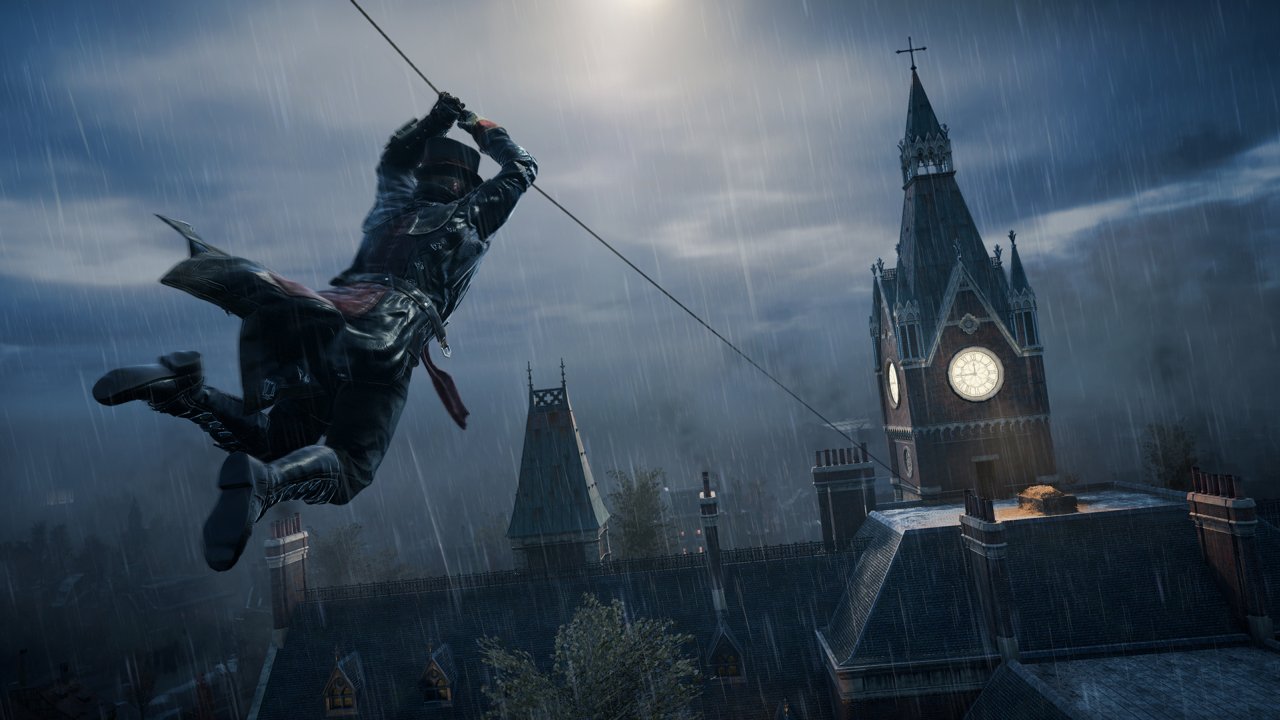
The series has explored a number of notable historical settings over the years – from Rome and Constantinople, to the more contemporary American East Coast. In Syndicate, players embark on a virtual journey to Victorian London circa late 1800s. Following a very brief introduction, we meet the protagonists - Jacob and Evie Frye, brother and sister who are experienced assassins. Fed up with performing sanctioned missions, they travel to London, with their goals of finding a piece of Eden, as well as stopping the Templar who has taken control over most of the city.
For most of the narrative, Syndicate feels rushed. We get zero background on the siblings, their past or present. There are some walls of text in the encyclopedia that you can read, but it’d be better if the game’s storytelling was able to fit these details in. They have a habit of taking a sample of the victim’s blood (ala Dexter), but this is never explained. Their father figure comes up often in conversation as a pivotal man during their upbringing, but we don’t even learn his name until a particularly dull mission very late in the game. The siblings even go through a “rivalry” stage, but it comes and goes so quick that it feels pointless and underdeveloped. Writing is partly to blame for this – while some genuinely funny dialogue exists, most of the script is monotone and predicable.
The narrative also suffers when it comes to other characters. There are only a few major faces, and they come and go so quickly, switching from friend to foe, that the betrayals and twists have little effect. Even the main villain, Crawford Starrick, is a typical criminal kingpin that has his hands in every aspect of the city’s life – factories, transportation, banks, government – but we never actually see him do anything horrific. It’s just because he’s a Templar, and occasionally shoots his servants, that we must believe this is an evil menace. Unseating him from power is Jacob’s main motivation; since Crawford is after the piece of Eden as well, this brings Evie a goal to work towards. Syndicate’s story is a decent one, but it’s very by the book and lacking a real start or a satisfying finish, with many assassination targets that barely buy into the evil Templars narrative. Plus, players can eliminate innocent policemen and Royal Guards that stand in their way without punishment. So who is the real villain here?
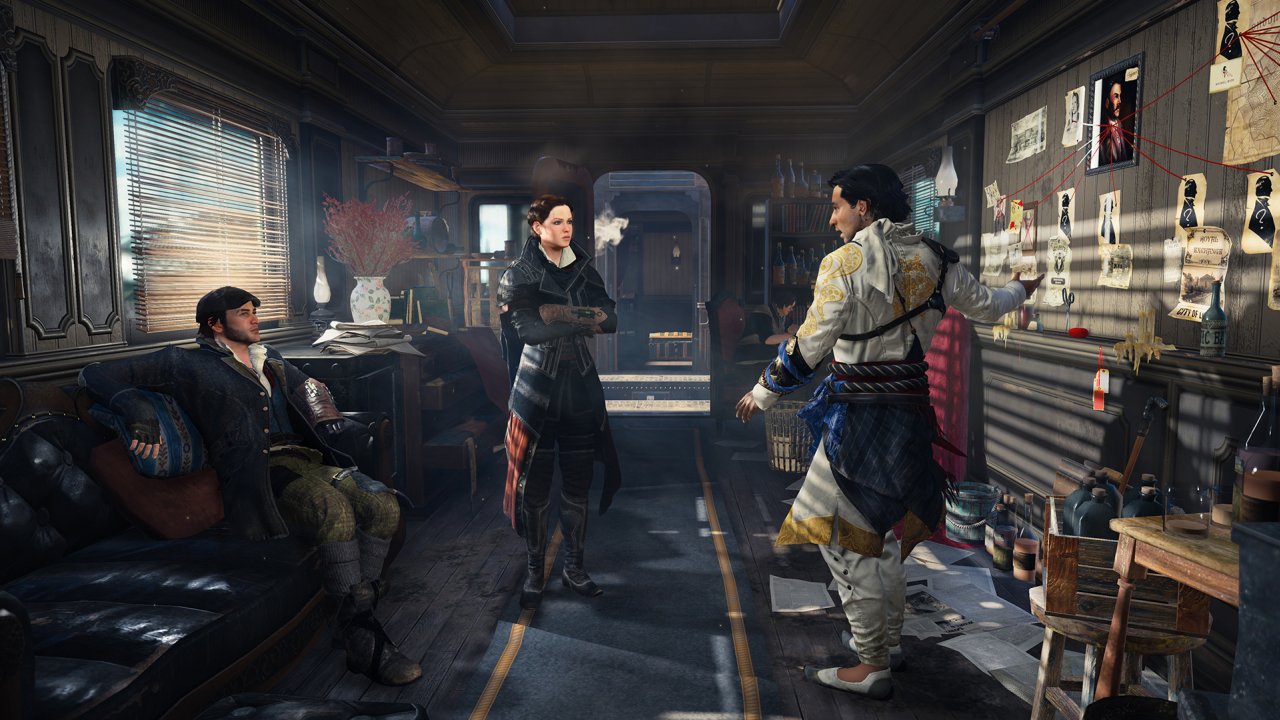
We must also touch briefly on the modern day aspect. After so many years and a lot of nonsense, Ubisoft is seemingly trying to cut their losses. Last year’s AC Unity introduced the concept of players being home users of the new Abstergo Entertainment system, drawn almost involuntarily into the modern day conspiracy. In Syndicate, the modern day “story” is about five short cutscenes, with zero player input. You watch the team struggle to find the same artifact in modern day London that you’re trying to discover in the 1800s. There is no introduction of who you are (same player from Unity?) or who these people are. And it ends with yet another supernatural cliffhanger. At this point in the franchise, the modern day narrative is becoming an insult to long time series fans – and to newcomers, it’s detrimental, as absolutely nothing is explained. This aspect of the franchise has been begging to be put out of its misery, and Syndicate only makes that case stronger.
But back to the real experience - London in the 1800s. Jacob’s goal is to assemble a gang (the Rooks) and take back control of the city, while Evie aims to hunt down the piece of Eden before it falls into the wrong hands. Their respective story missions follow these concurrent narratives, though there is not much player choice involved – you’ll need to complete the missions for both characters before moving to the next sequence. The missions that you undertake are very typical for the series, following much the same structure as AC Unity. Like the story, they are painfully familiar. There are some highlights – like crossing the river Thames by jumping across moving boats, or infiltrating famous landmarks – but these moments are memorable thanks to the new locale, rather than mission design.
As always, there are tons of optional activities. The major meta-game in Syndicate is freeing London from Templar control. The map is divided into a few boroughs, each with a number of sections that contain a conquest mission. Completing these missions will free the area, and eventually once the whole borough is clear, the gang leader will challenge you to a gang war. Completing this war will let you assume control of the whole borough, but it’s not a very impactful event. There won’t be random enemies in the streets, but otherwise the game world remains unchanged.
The conquest missions come in four flavors – Bounty Hunt sees you kidnap and escort a target from his base to the police; in Templar Hunt you must eliminate a specific enemy; Child Liberation tasks you with infiltrating a building to eliminate a target and free the kids, and the classic Gang Stronghold simply asks to eliminate all enemies in the area. The kidnapping mechanic requires you to grab a hold of the target and walk them out of the area without alerting anyone. The rest are bite-sized classic AC experiences, and despite their familiar and similar nature, continue to entertain as you repeat them in new locations. After enough missions in a borough are complete, the gang leader will challenge you to a gang war – a big brawl followed by a mini boss fight. These boss fights are very shallow, amounting to little more than beating down on your opponent and occasionally blocking a QTE-like series of attacks. The ones you encounter in the main story are nearly identical, and similarly disappointing.
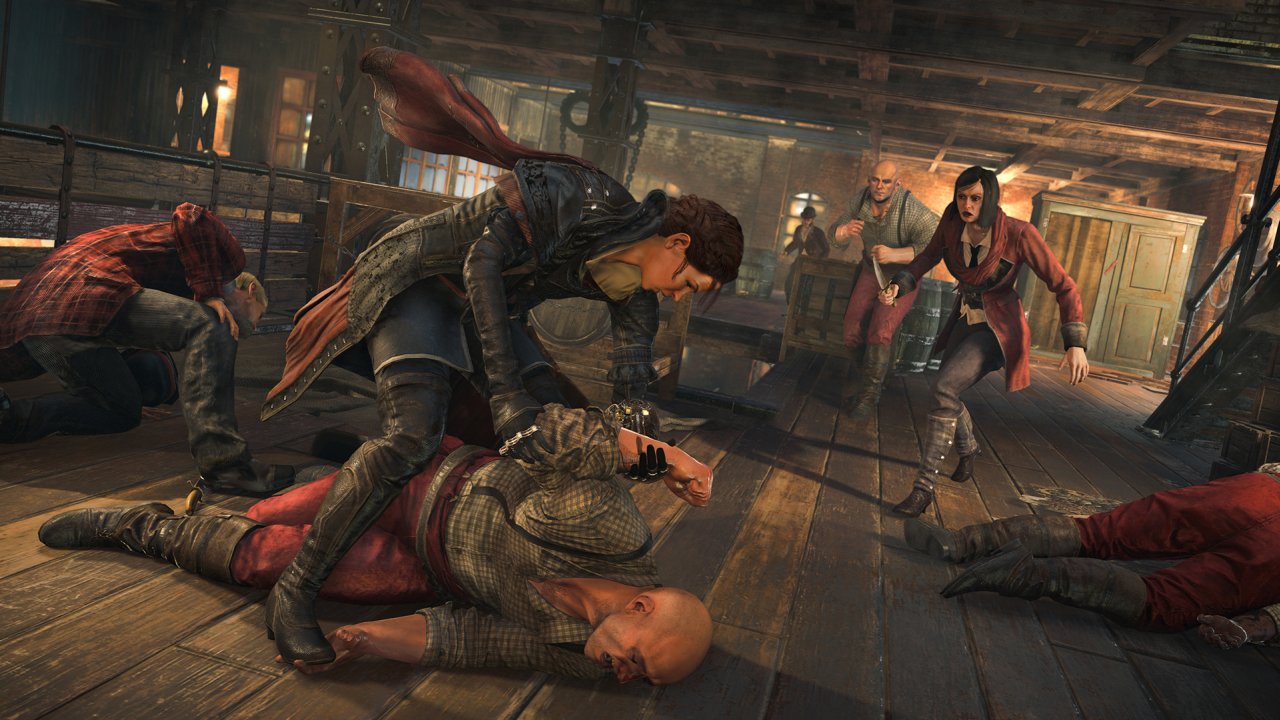
Story side missions include adventures with historical figures like Charles Darwin and Karl Marx. Other activities are fairly typical for an open world - from collecting things, to performing side missions for income. You can hijack or escort cargo carts, raid boats, participate in carriage races, or even rob trains and boats. The latter activities are uniquely enjoyable due to their mobile nature. Trying to get onto a moving train or boat is fun in itself, and then working your way through the ship/train makes for enjoyable moments. Performing side missions earns you loyalty with a few of the minor characters, and that gives you free items.
Both Jacob and Evie are playable characters, and you can swap between them at any time, except for character-specific missions. The siblings share everything – all XP earned, items, currency, and so on. You can craft or purchase new equipment, upgrade your pouches, weapons, and so on. There is a skill tree, however all except for the last few skills are the same between the two characters. Your upgradable skills range from the typical health increases to improved stealth and new combat abilities. The few late game unique skills cater to the strengths of each – Jacob is more of a fighter so he gets survival and combat skills, while Evie has better stealth ability and can unlock invisibility when not moving. The game does a great job of dishing out experience points, cash, and gear, so most players should be able to remain very well stocked throughout the campaign. It helps that an early skill lets you auto-loot any foes you eliminate silently, and that all chests can be opened without any online nonsense. If you still somehow struggle, there is an option to buy almost everything with microtransactions – from in-game cash to XP boosts and crafting materials. The game’s economy is generous enough that no player should ever need to utilize this option, but the trend continues to be worrisome.
Jacob and Evie can use the same weapons, skills and tools – and while this helps you from going broke trying to outfit them both, it’s a bit disappointing that the siblings don’t play very differently. The base stats being different doesn’t really translate into very notable gameplay differences. It’s easier to survive in a fight as Jacob, but he’s also decent enough in stealth. Evie stays hidden better, but can hold her own if things go south. Also, from a story mission perspective, the two never cross paths until the finale; it’s a missed opportunity to perform missions from two different concurrent perspectives.
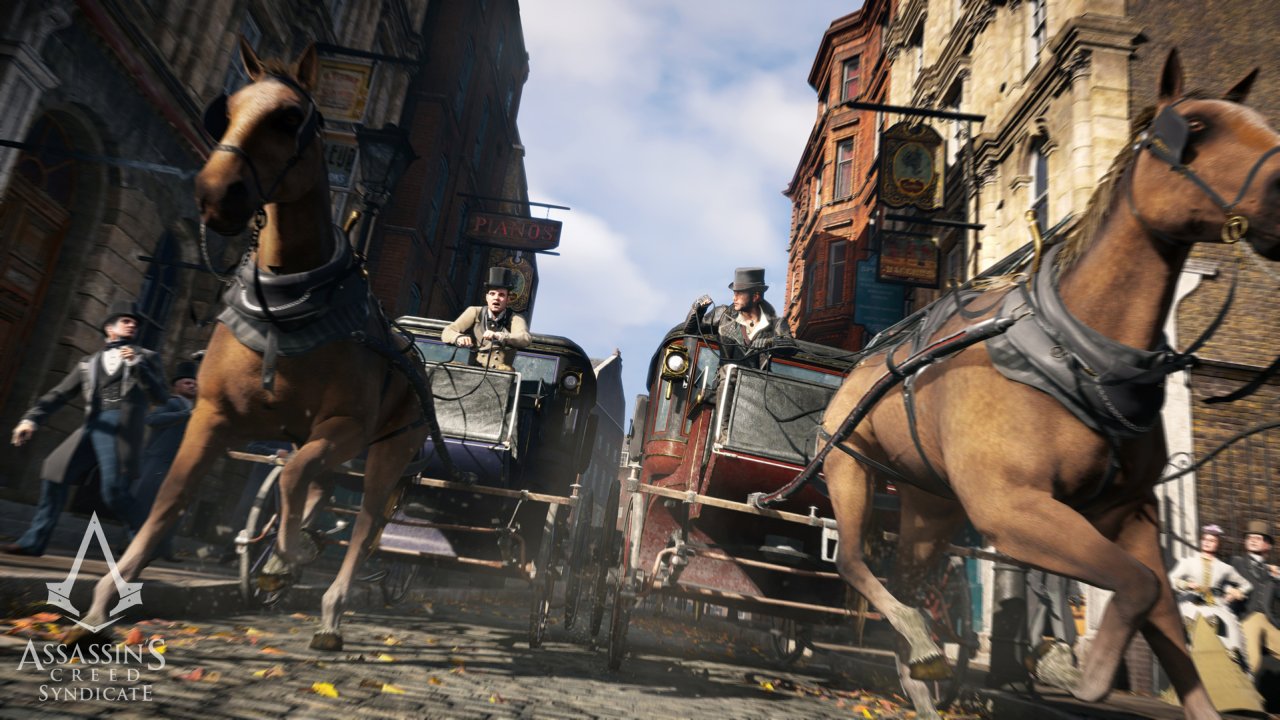
The core gameplay experience in Syndicate is very familiar at first. You’ll climb tall locations to reveal the map, choose to participate in random world events, and use Eagle Vision to scout the enemy locations. Stealth remains satisfying, and clearing the whole area without raising an alarm is satisfying. A new indicator appears around your character when in stealth mode, letting you note any nearby enemies. Also, unlike Unity, enemies can reach the rooftops again, so you’re not safe just hanging out up there.
But there is a big new mechanic that changes the way you play – the grappling hook. You can zip up to any rooftop or column quickly, forgoing that whole manual climbing business. It becomes almost Batman Arkham-like – do a sweet aerial assassination, and zip back up to the roof in a flash. It’s also a key traversal mechanic – the streets of London are very wide, but the zipline’s impressive range lets you cross large distances easily. You can zipline at almost any angle – so for example, those map-revealing synchronization spots can be reached in moments. It also lets you create new opportunities out of thin air, literally. Create a zipline from roof to roof, and then drop down on your foe in the middle of an open square. By all accounts, the grappling hook is a fantastic addition that will change the way you play. But a question lingers – with the climbing, a core mechanic of the franchise, now essentially becoming obsolete, where can we go from here? Will the series begin to shift and transform its identity like the Tomb Raider reboot?
Sadly some of the other gameplay aspects in Syndicate aren’t as fully fleshed out. After last year’s very smooth traversal mechanics in AC Unity, Syndicate feels like a step back. You’ll often get stuck, jump on objects you didn’t intend, and overall it feels clunky and a chore to navigate. Stealth is also unreliable; nearby enemies spot your assassinations from cover, so what’s the point? You’re also never sure of the enemies’ vertical field of view. There is no way to tell if the angle you’re zipling at will get you spotted or not; consistency is lacking in alerting enemies from above. This sort of complaint extends into the AI behavior in general. Enemies often get frozen in place when you break their patrol patterns, leaving you cornered and forced to break stealth. Equally frustrating are missed assassination opportunities because the AI literally gets confused or a script fails, and they don’t leave the area like they should because they’re stuck on an object. Finally, the NPC crowds are useless – gone is the option to hold a button and walk alongside them, in stealth. The annoying part is that in multiple missions, the game recommends using the crowd as a way to enter a hostile area; but they all glitch and bump around you, quickly breaking your cover, and getting you spotted.
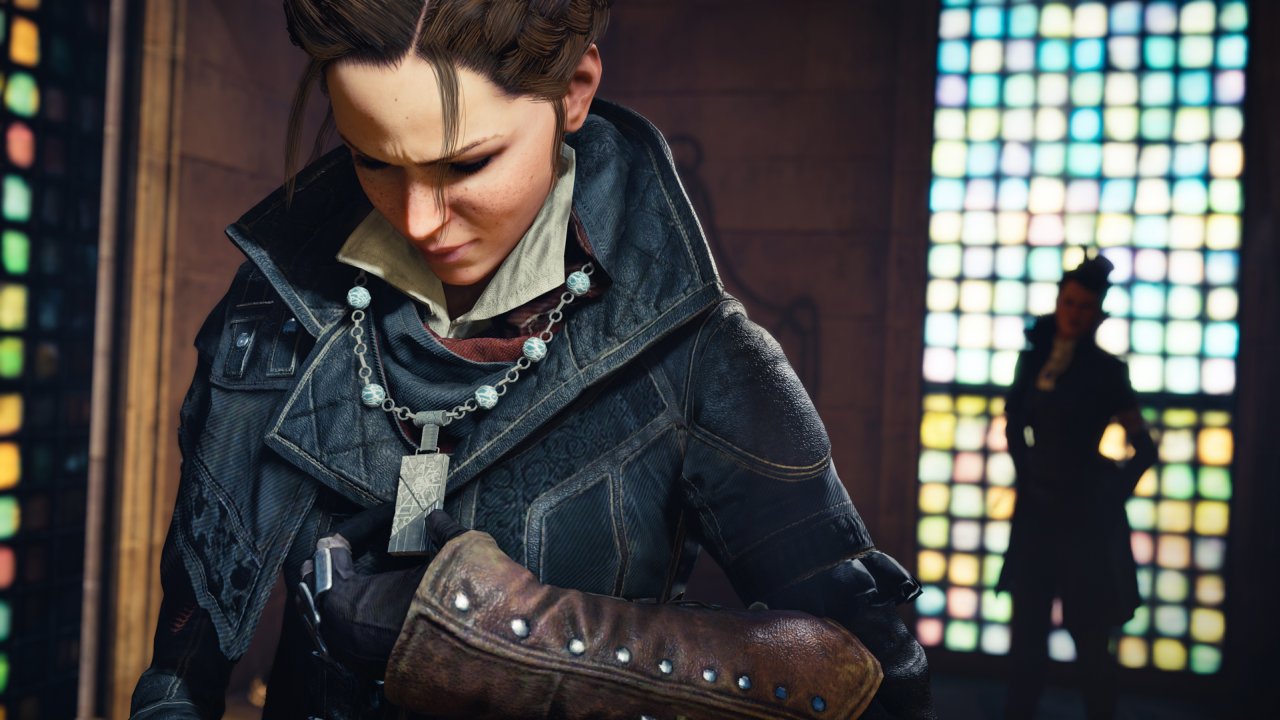
And when the stealth mechanics fail, players will get involved in a brawl - a new and different combat experience. After attempts to reign in the counter-heavy, button mashing of the past games in Unity, Syndicate tosses it all out the window and becomes a full-on, in your face fight. All your weapons are close range - knuckle braces, canes, or kurkis – and a short range pistol for some firepower. It’s period-appropriate, though, and it changes up the gameplay quite a bit. You’ve got one attack button, a block-breaking attack, and a counter move. These three inputs create for very fast paced, relatively easy combat, as you punch and combo your way to victory. There’s even a hit counter, and the combat is fun if shallow. At least it also brings with it a completely new set of animations, and very brutal yet satisfying finishing moves. Further, there are a lot of contextual attacks and takedowns that use the environment realistically, almost like in the Bourne Conspiracy or Sleeping Dogs.
Assassin’s Creed was never a particularly challenging franchise, and Syndicate continues this trend. The problem is, that leaves little reason to use one of the game’s new additions – your Rooks gang. As you take over London, the streets will become inhabited with friendly NPC gang members that you can hire to follow you around. It’s very similar to the mercenaries from the past games. The difference being, there is a big upgrade tree – everything from improving their combat ability, to letting them drive better carriages. But it seems a bit futile – the upgrades are expensive, and the whole game is easily completed without using the Rooks at all. It’s nice to have a few guys to back you up during an impromptu stronghold brawl, but unless you plan ahead to fight, there’s little need to use your gang. Plus with changes to enemy AI – only the enemies in immediate area will engage if you’re discovered, and those across the street or in the next room won’t hear the screams of their comrades as you put your fists through their arms – meaning that breaking stealth isn’t as punishing as in the past games.
Another new mechanic is the introduction of drivable carts and carriages, appropriate for the era and setting of the game. The driving mechanics are about as awkward and unwieldy as you might expect in an Assassin’s Creed game trying to introduce vehicles. It’s not all bad though, and after a while you’ll be able to maneuver through London’s wide and narrow streets without breaking too many lamp posts. You can boost your speed by whipping the horses, and use a ram ability on either side. Things do get awkward – NPCs only have basic interaction abilities with the carriages, and getting off and on one can often confuse them. You can also climb on top and jump to a nearby carriage, but the result often leaves you on the asphalt getting run over, or jumping on the wrong carriage altogether.

Last year’s AC Unity had a mixed quality of presentation and technical aspects. Syndicate seems to play it safe – the crowds are back to normal size, and the streets aren’t as busy. And while that means a smoother visual experience overall, there were still notable instances of whole groups of people appearing and disappearing from view. The indoor environments are not as impressive, and outdoors, while immersive with nice weather and lighting effects and a day/night cycle – don’t look particularly jaw dropping. However, in keeping with the series standard, the London representation attempts to be very authentic, and many famous landmarks are accurately recreated. A lot of the enemies look exactly the same, and it feels more obvious now than in the past – especially when a random thug appears in a cutscene with dialog. The framerate holds steady, at least. Loading times are notably long. The audio is a bit more impressive, with dramatic violin, piano and other classical instruments used in the soundtrack; it even includes occasional vocal backing. Lastly, the franchise has finally found an appropriate era to use voice actors with a British accent.
The end result is that Assassin’s Creed Syndicate produces mixed feelings. The Victorian Era setting is faithfully recreated as always, and the new grappling hook and melee combat focus drastically transform the gameplay. Drivable carriages also change things up a bit, but the idea of gangs never really takes off. A variety of activities are all well designed and can be engaging, though nothing here is particularly groundbreaking for the franchise. After a great cooperative outing in AC Unity, multiplayer is inexplicably absent. There’s enough in Assassin’s Creed Syndicate to make it worth checking out, but it feels more like a standard yearly release, rather than a sequel to Unity that’s trying to push the series forward.
 Comments
Comments




















